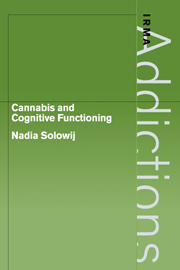Book contents
- Frontmatter
- Contents
- Series editor's preface
- Author's acknowledgements
- 1 Statement of the problem
- PART 1 A REVIEW OF THE LITERATURE
- 2 Cannabis the drug
- 3 Acute effects of cannabis on cognitive functioning
- 4 Evidence for brain damage associated with the long-term use of cannabis
- 5 Chronic effects of cannabis on cognitive functioning
- 6 Selective attention and event-related potentials (ERPs)
- PART 2 RESEARCH
- Appendix
- References
- Index
6 - Selective attention and event-related potentials (ERPs)
from PART 1 - A REVIEW OF THE LITERATURE
Published online by Cambridge University Press: 16 September 2009
- Frontmatter
- Contents
- Series editor's preface
- Author's acknowledgements
- 1 Statement of the problem
- PART 1 A REVIEW OF THE LITERATURE
- 2 Cannabis the drug
- 3 Acute effects of cannabis on cognitive functioning
- 4 Evidence for brain damage associated with the long-term use of cannabis
- 5 Chronic effects of cannabis on cognitive functioning
- 6 Selective attention and event-related potentials (ERPs)
- PART 2 RESEARCH
- Appendix
- References
- Index
Summary
Selective attention
Selective attention is one of a number of processes which collectively comprise the state of attending to the environment. William James described the essence of this process more than a century ago:
Everyone knows what attention is. It is the taking possession by the mind, in clear and vivid form, of one out of what seem several simultaneously impossible objects or trains of thought. Focalization, concentration of consciousness are of its essence. It implies withdrawal from some things in order to deal effectively with others.
(James, 1890).Thus, selective attention could simply be defined as those processes which allow some stimuli to be processed more rapidly and effectively than others, or “the predisposition of an organism to process selectively relevant, as compared to irrelevant, environmental information” (Harter & Aine, 1984). An entirely adequate model of selective attention has not yet been formulated. Selective attention may be viewed as a facilitatory mechanism that enhances the processing of relevant stimuli, or it may be viewed as a filtering mechanism protecting a limited capacity central processor from overload by irrelevant sources of information.
Early behavioural research and theorizing in the area was initiated by Broadbent (e.g. 1958). The aim of continuing research has been to elucidate the processes involved in the selection of relevant from irrelevant information, to determine where, how and when differential processing occurs, and to establish the fate of the irrelevant information or to what extent it is processed.
Information
- Type
- Chapter
- Information
- Cannabis and Cognitive Functioning , pp. 111 - 132Publisher: Cambridge University PressPrint publication year: 1998
